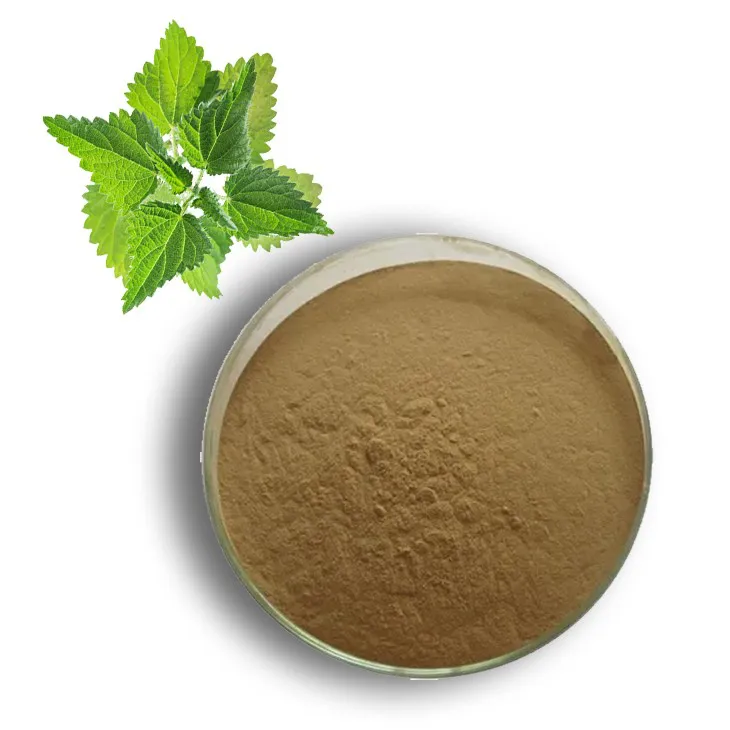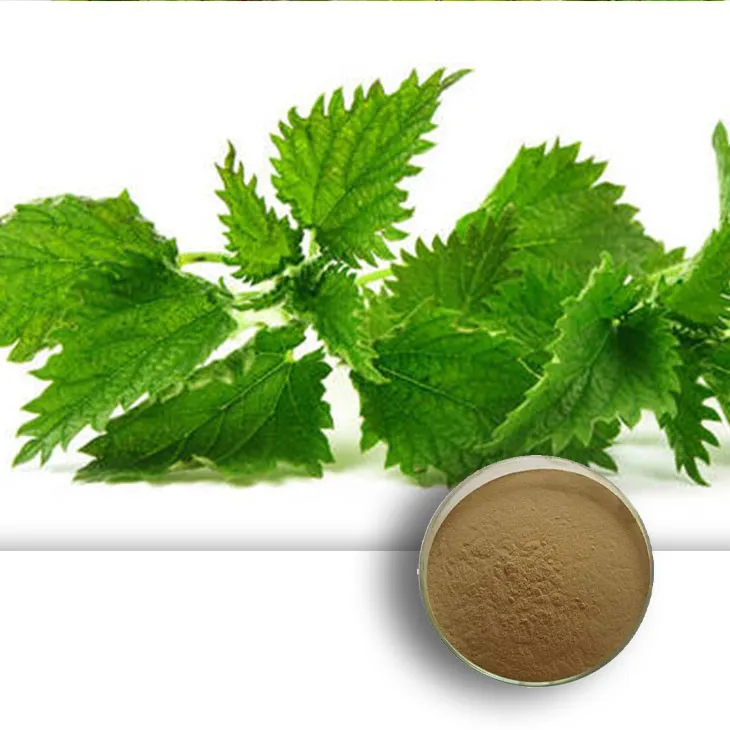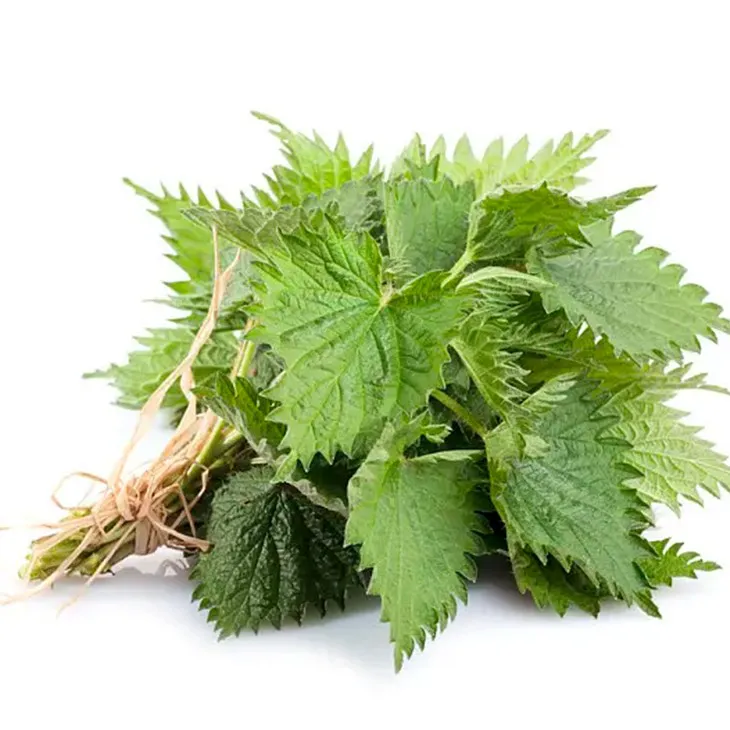- 0086-571-85302990
- sales@greenskybio.com
Use nettle leaf extract? Make sure you source from sustainable suppliers!
2024-12-15

1. Introduction to Nettle leaf extract
Nettle leaf extract has emerged as a highly sought - after natural resource in various industries. It is rich in nutrients, antioxidants, and bioactive compounds. In the field of medicine, it has been associated with anti - inflammatory properties, which can potentially be used in the treatment of conditions such as arthritis. In the cosmetic industry, its antioxidant content makes it a valuable ingredient for skin - care products, as it can help combat free radicals and slow down the aging process.
Additionally, in the food and beverage sector, Nettle leaf extract is being explored for its potential to add nutritional value. For example, it can be used in herbal teas or as a supplement in functional foods. Given its wide - ranging applications, the demand for nettle leaf extract is on the rise.

2. The Importance of Sourcing from Sustainable Suppliers
2.1 Quality Assurance
Sustainable suppliers are more likely to follow strict quality control measures. They understand the importance of maintaining the integrity of the nettle leaf extract. Since sustainable practices often involve proper cultivation and harvesting techniques, the resulting extract is likely to be of higher quality. For instance, sustainable farming of nettles may involve avoiding the use of excessive pesticides and fertilizers, which could otherwise contaminate the extract.
2.2 Environmental Conservation
Nettles are an important part of the ecosystem. When sourced from sustainable suppliers, it ensures that the harvesting of nettle leaves does not cause damage to the natural environment. Sustainable suppliers are more likely to engage in practices such as rotational harvesting, which allows the nettle plants to regenerate. This helps in maintaining the biodiversity of the area where nettles grow. If not sourced sustainably, over - harvesting could lead to the depletion of nettle populations, affecting other organisms that depend on the plant for food or shelter.
2.3 Ethical Business Practices
Sourcing from sustainable suppliers is also an ethical choice. It supports fair trade and the well - being of local communities involved in nettle cultivation. Sustainable suppliers often ensure that farmers are paid fairly for their produce. This helps in improving the living standards of those involved in the nettle supply chain. Moreover, it promotes transparency in the business, which is crucial for building trust between producers, suppliers, and consumers.

3. How to Identify Sustainable Suppliers
3.1 Certification and Standards
Look for suppliers who have relevant certifications. For example, organic certifications can be a good indicator of sustainable practices. Suppliers that adhere to international standards such as the Global Organic Textile Standard (GOTS) or the United States Department of Agriculture (USDA) Organic standards are likely to be more sustainable. These certifications ensure that the nettle cultivation and extraction processes meet certain environmental and quality requirements.
3.2 Supply Chain Transparency
A sustainable supplier should be able to provide clear information about their supply chain. This includes details about where the nettles are sourced from, how they are cultivated, and what extraction methods are used. Transparency helps in verifying that the supplier is following sustainable practices. For example, if a supplier is unable or unwilling to disclose the origin of the nettles, it could be a red flag indicating potential issues such as illegal harvesting or poor environmental practices.
3.3 Reputation and Reviews
Research the reputation of the supplier. Check online reviews, testimonials from other customers, or industry rankings. A supplier with a good reputation is more likely to be sustainable. For example, if a supplier has been in business for a long time and has positive feedback from clients regarding the quality of their nettle leaf extract and their sustainable practices, it is a positive sign.

4. Challenges in Sourcing from Sustainable Suppliers
4.1 Limited Availability
One of the main challenges is the limited availability of nettle leaf extract from sustainable sources. Compared to non - sustainable sources, the production volume may be lower. This is because sustainable cultivation and extraction methods often require more time and resources. For example, organic farming of nettles may have lower yields in the short - term compared to conventional farming methods that use chemical fertilizers. As a result, the supply may not always meet the high demand, especially in industries where the use of nettle leaf extract is rapidly growing.
4.2 Higher Cost
Sustainable suppliers may often charge higher prices for their nettle leaf extract. This is due to the added costs associated with sustainable practices. For instance, using organic fertilizers and following strict environmental regulations can increase the production cost. This higher cost can be a deterrent for some businesses, especially those operating on tight budgets. However, it is important to consider the long - term benefits of sourcing sustainably, such as quality assurance and environmental conservation.
4.3 Lack of Awareness
There is a lack of awareness among some consumers and businesses about the importance of sourcing nettle leaf extract from sustainable suppliers. Some may not be fully informed about the environmental and ethical implications of their sourcing decisions. This lack of awareness can lead to a continued preference for cheaper, non - sustainable sources, further discouraging the growth of the sustainable nettle leaf extract market.
5. Strategies for Overcoming the Challenges
5.1 Supporting Local Suppliers
By supporting local sustainable suppliers, businesses can help increase the availability of nettle leaf extract. Local suppliers may have a better understanding of the local environment and can potentially increase production over time. For example, local communities can be encouraged to engage in nettle cultivation through initiatives such as providing training on sustainable farming methods and offering fair prices for their produce. This not only helps in overcoming the availability issue but also promotes local economic development.
5.2 Long - Term Cost - Benefit Analysis
Businesses should conduct a long - term cost - benefit analysis when considering sourcing from sustainable suppliers. While the initial cost may be higher, the long - term benefits such as improved product quality, positive brand image, and environmental conservation can outweigh the costs. For example, a company that uses sustainable nettle leaf extract in its products may attract more environmentally - conscious consumers, leading to increased sales in the long run.
5.3 Education and Awareness Campaigns
To address the lack of awareness, education and awareness campaigns are essential. These can be targeted at both consumers and businesses. For consumers, information about the benefits of sustainable nettle leaf extract can be disseminated through various channels such as social media, product labels, and educational events. For businesses, workshops and seminars can be organized to educate them about the importance of sustainable sourcing and how it can contribute to their overall success.
6. Conclusion
Nettle leaf extract offers a wealth of potential benefits across multiple industries. However, when using it, sourcing from sustainable suppliers is of utmost importance. This not only ensures the quality of the extract but also has far - reaching implications for environmental conservation and ethical business practices. Although there are challenges in sourcing from sustainable suppliers, such as limited availability, higher cost, and lack of awareness, there are strategies that can be employed to overcome these challenges. By supporting local suppliers, conducting long - term cost - benefit analyses, and promoting education and awareness campaigns, we can move towards a more sustainable future in the nettle leaf extract industry.
FAQ:
Q1: Why is it important to source nettle leaf extract from sustainable suppliers?
Sourcing from sustainable suppliers is crucial for several reasons. Firstly, it helps in environmental conservation. Sustainable suppliers follow practices that protect the natural habitats where nettles grow, ensuring that the plant population remains stable and the ecosystem is not disrupted. Secondly, it guarantees the quality of the nettle leaf extract. Sustainable suppliers are more likely to use proper harvesting and extraction methods, which lead to a high - quality product. Finally, it promotes ethical business practices, as they ensure fair treatment of workers involved in the collection and processing of nettle leaves.
Q2: How can one identify a sustainable supplier of nettle leaf extract?
There are several ways to identify a sustainable supplier. Look for certifications such as organic certifications, which often indicate sustainable farming practices. Check if the supplier has a transparent supply chain, meaning they can provide information about where the nettles are sourced from, how they are harvested, and what extraction methods are used. Also, research the supplier's reputation in the industry. Reviews from other customers or industry associations can give insights into their sustainability practices.
Q3: Are there any regulations regarding the sustainable sourcing of nettle leaf extract?
While there may not be specific regulations solely for nettle leaf extract in all regions, there are general environmental and agricultural regulations that can apply. For example, in some areas, regulations on sustainable land use, pesticide use, and worker safety can impact the sourcing of nettle leaves. Additionally, international standards like Fairtrade may be relevant if the supplier claims to follow ethical business practices. However, the industry is also increasingly self - regulating, with trade associations setting guidelines for sustainable sourcing of natural products like nettle leaf extract.
Q4: What are the benefits of using nettle leaf extract from sustainable sources for consumers?
Consumers can benefit in multiple ways. Firstly, they can be assured of a high - quality product. Sustainable sourcing often means better quality control during the extraction process. Secondly, it gives consumers the satisfaction of making an environmentally and ethically conscious choice. By choosing products with nettle leaf extract from sustainable sources, consumers are supporting sustainable development and ethical business operations. Additionally, products from sustainable sources may have fewer contaminants as they are less likely to be sourced from areas with improper agricultural practices.
Q5: How does sustainable sourcing of nettle leaf extract impact the local communities?
Sustainable sourcing has a positive impact on local communities. It can provide employment opportunities for local people involved in the harvesting and initial processing of nettle leaves. When suppliers follow sustainable practices, they are more likely to invest in the local community, for example, by providing training to workers or supporting local infrastructure development. Moreover, sustainable sourcing ensures that the resource (nettle leaves) is conserved for future generations in the local area, which is important for the long - term economic and environmental stability of the community.
Related literature
- Sustainable Sourcing of Botanical Extracts: A Review"
- "The Importance of Sustainability in the Natural Product Industry: The Case of Nettle Leaf Extract"
- "Ethical and Sustainable Supply Chains for Herbal Extracts: Focus on Nettle"
- ▶ Hesperidin
- ▶ citrus bioflavonoids
- ▶ plant extract
- ▶ lycopene
- ▶ Diosmin
- ▶ Grape seed extract
- ▶ Sea buckthorn Juice Powder
- ▶ Beetroot powder
- ▶ Hops Extract
- ▶ Artichoke Extract
- ▶ Reishi mushroom extract
- ▶ Astaxanthin
- ▶ Green Tea Extract
- ▶ Curcumin Extract
- ▶ Horse Chestnut Extract
- ▶ Other Problems
- ▶ Boswellia Serrata Extract
- ▶ Resveratrol Extract
- ▶ Marigold Extract
- ▶ Grape Leaf Extract
- ▶ blog3
- ▶ blog4
- ▶ blog5
-
Eyebright Extract
2024-12-15
-
Gynostemma pentaphyllum extract
2024-12-15
-
Genistein
2024-12-15
-
Carrageenan Extract Powder
2024-12-15
-
Coconut Water Powder
2024-12-15
-
Okra Extract
2024-12-15
-
Cat Claw Extract
2024-12-15
-
Senna Leaf Extract
2024-12-15
-
Red Wine Extract
2024-12-15
-
Berberis aristata Extract
2024-12-15





















